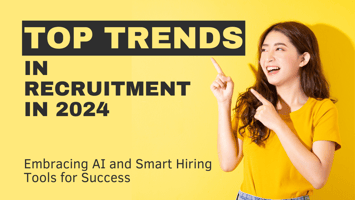Introduction The Challenges Faced by Recruiters The Role of AI in Recruitment Transforming...
Can Emotion AI help you win the talent war?
In the fast-paced world of talent acquisition, recruiters are constantly seeking innovative solutions to streamline the hiring process and identify the best candidates. Traditional methods of assessing applicants, such as interviews and resumes, often fall short of providing a comprehensive understanding of a candidate’s suitability for a role. This is where Emotion AI comes into play – a groundbreaking technology that has the potential to revolutionise the way organisations identify and hire top talent.
- What is Emotion AI?
- The Role of Emotion AI in Talent Acquisition
- Emotion AI Tools for Talent Acquisition
- The Future of Emotion AI in Talent Acquisition

What is Emotion AI?
Emotion AI, also known as Affective Computing, is an emerging field that focuses on developing algorithms and technologies to recognise, interpret, and respond to human emotions. It involves the use of advanced machine learning models and deep learning techniques to analyse facial expressions, body language, voice tone, and other non-verbal cues to understand human emotions accurately.
The Role of Emotion AI in Talent Acquisition
Enhancing Candidate Assessment
Traditional recruitment processes heavily rely on interviews and resumes, which may not provide a comprehensive understanding of a candidate’s soft skills and personality traits. Emotion AI can bridge this gap by analysing non-verbal cues during virtual interviews. By detecting and interpreting facial expressions, gestures, and other emotional signals, Emotion AI can provide valuable insights into a candidate’s emotional intelligence, communication skills, and cultural fit.

According to the Global Talent Trends report, over 68% of talent professionals evaluate soft skills by picking up on non-verbal cues and facial expressions during an interview. Emotion AI takes this evaluation to a whole new level by accurately detecting emotions such as nervousness, distraction, anger, happiness, and excitement based on micro-expressions that are not detectable by the naked eye but are highly indicative of a person’s emotional state of mind.
Emotion AI helps the interviewer to detect emotions such as nervousness, distraction, anger, happiness, excitement, and more, based on micro-expressions that are not detectable by the naked eye but are highly indicative of the person’s emotional state of mind.
Improving Recruitment Efficiency
Recruiters often spend an enormous amount of time manually screening resumes and sourcing candidates, which can be a time-consuming and labour-intensive process. Emotion AI-powered tools can automate these administrative tasks, saving recruiters precious time and allowing them to focus on more strategic aspects of talent acquisition.
With Emotion AI, recruiters can leverage algorithms to analyse candidate profiles and identify potential matches based on predefined parameters. This not only speeds up the screening process but also ensures a more objective and unbiased evaluation of candidates.
Enabling Remote Recruitment
The COVID-19 pandemic has accelerated the adoption of remote recruitment practices. Video interviews have become the norm, allowing recruiters to connect with candidates from anywhere in the world. However, the lack of face-to-face contact in remote interviews limits the assessment of a candidate’s soft skills, which are crucial for their performance at work.

Emotion AI overcomes this limitation by analysing facial expressions and other non-verbal cues during virtual interviews. Recruiters can gain valuable insights into a candidate’s emotional responses, communication style, and level of engagement, regardless of the physical distance.
Emotion AI Tools for Talent Acquisition
Several AI tools and platforms have emerged in the market, offering innovative solutions to enhance the talent acquisition process. Interviewguru.co, is one of the leaders in this field who leverage advanced algorithms and machine learning models to accurately detect and interpret human emotions. Here are some notable Emotion AI tools for talent acquisition:
1. Video Interview Assessments
AI Video Interviews enable recruiters to assess candidates’ emotional responses and non-verbal cues during virtual interviews. By capturing and analyzing facial expressions, voice tone, and body language, these tools provide valuable insights into a candidate’s emotional intelligence and suitability for a role.
Recruiters can ask challenging questions to observe candidates’ reactions and gauge their emotional responses. Emotion AI algorithms can detect emotions such as nervousness, confidence, enthusiasm, and sincerity, helping recruiters make more informed hiring decisions.
2. Automated Assessment Screening
Automated assessment screening tools powered by Emotion AI enable recruiters to predict a candidate’s on-the-job performance and retainability. These tools analyse candidates’ emotional responses during assessment tests, providing insights into their problem-solving skills, decision-making abilities, and overall emotional intelligence.
By combining traditional assessment methods with Emotion AI, recruiters can gain a deeper understanding of a candidate’s suitability for a role and make more accurate predictions about their future performance.
3. Virtual Proctoring
Virtual proctoring tools equipped with Emotion AI capabilities help ensure the credibility of assessment tests in virtual recruitment. These tools monitor candidates’ behaviour and emotional responses during online assessments, alerting recruiters to any suspicious activities or identity mischief.
By leveraging Emotion AI, recruiters can mitigate the risk of cheating and ensure the integrity of assessment results, improving the overall quality of the talent acquisition process.
The Future of Emotion AI in Talent Acquisition
As technology continues to advance, Emotion AI holds tremendous potential to transform the way organisations attract, assess, and hire talent. With ongoing research and development, Emotion AI is expected to add even more human-like touches to the recruitment process, enabling recruiters to gauge a candidate’s emotional intelligence, cultural fit, and growth potential.
Emotion AI is still in its early stages, but with time, it will bring incredible advancements to the field of recruitment, allowing for a more holistic evaluation of candidates.
Emotion AI is poised to revolutionise the talent acquisition landscape by providing recruiters with a deeper understanding of candidates’ emotional intelligence, communication skills, and cultural fit. Through the analysis of facial expressions, gestures, voice confidence analysis and other non-verbal cues, Emotion AI-powered tools offer valuable insights that traditional recruitment methods often miss.
As organisations strive to attract and retain top talent, Emotion AI can play a pivotal role in identifying the right candidates and making informed hiring decisions. By embracing Emotion AI tools and platforms, recruiters can streamline the recruitment process, enhance candidate assessment, and create a more efficient and effective talent acquisition strategy.
With the continuous evolution of Emotion AI technology, the future of talent acquisition looks promising, with increased automation, objectivity, and human-like evaluation capabilities. As organisations adapt to the changing recruitment landscape, Emotion AI will undoubtedly be a key driver in their quest to win the talent war.



